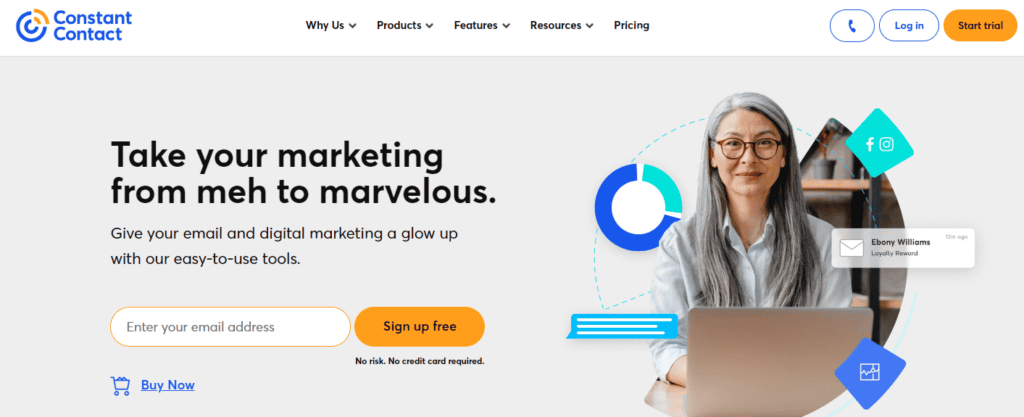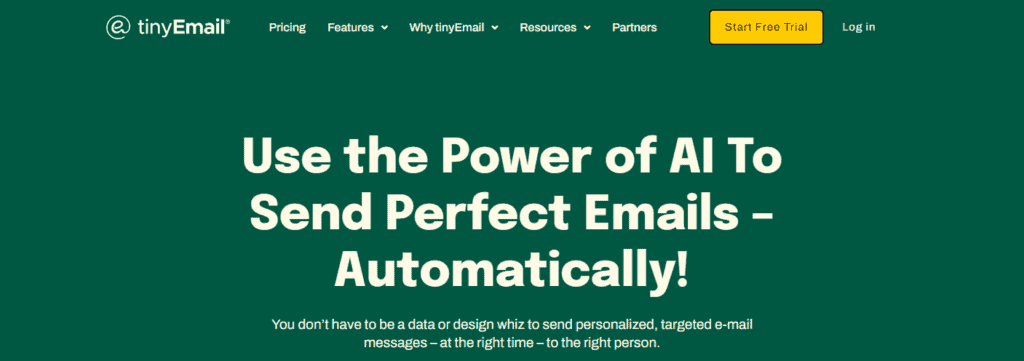
When it comes to email marketing, choosing the right tool is crucial for the success of your campaigns. Constant Contact and Tinyemail are two popular email marketing platforms that offer unique features and benefits. In this article, we will compare both to help you decide which one is the best fit for your business.
Constant Contact is a robust email marketing tool that offers a wide range of features, including email automation, customizable templates, and social media marketing. On the other hand, Tinyemail is a more affordable option that is geared towards startups and solopreneurs.
Constant Contact: Pros and Cons

When it comes to email marketing platforms, Constant Contact is a popular option that has been around since 1995. Here are some pros and cons to consider:
Pros
- User-friendly interface: Constant Contact is known for its user-friendly interface that makes it easy to create and send email campaigns.
- Advanced features: Constant Contact offers a variety of advanced features, such as email automation, list segmentation, and A/B testing, that can help businesses optimize their email campaigns.
- Integrations: Constant Contact integrates with a variety of third-party apps and services, including social media platforms, e-commerce platforms, and more.
- Customer support: Constant Contact offers excellent customer support, including phone, chat, and email support, as well as a knowledge base and community forum.
Cons
- Pricing: Constant Contact can be more expensive than some other email marketing platforms, with plans starting at $20 per month.
- Limited customization: While Constant Contact offers a variety of customizable templates, some users may find the customization options to be limited compared to other platforms.
- No free plan: Unlike some other email marketing platforms, Constant Contact does not offer a free plan, which may be a drawback for businesses on a tight budget.
Overall, Constant Contact can be a great option for businesses that are looking for a user-friendly email marketing platform with advanced features and good customer support. However, the pricing and limited customization options may be drawbacks for some users.
TinyEmail: Pros and Cons

When it comes to TinyEmail, there are several pros and cons to consider before choosing it as your email marketing tool. Here are some of the key advantages and disadvantages of using TinyEmail:
Pros
- Simple and Cost-effective: TinyEmail is a simple and cost-effective email marketing tool that is perfect for marketers and entrepreneurs who are just starting out. It offers all the basic features you need to get started with email marketing, without overwhelming you with too many options or features.
- Easy to Use: TinyEmail is incredibly easy to use, even if you have no prior experience with email marketing. Its user-friendly interface and intuitive drag-and-drop editor make it easy to create and send professional-looking emails in minutes.
- Good Deliverability: TinyEmail has a good reputation for deliverability, which means that your emails are more likely to land in your subscribers’ inboxes instead of their spam folders.
Cons
- Limited Features: While TinyEmail is great for beginners, it may not offer enough features for more advanced email marketers. For example, it lacks advanced automation features, which means you won’t be able to set up complex email sequences or trigger-based campaigns.
- Limited Customization: TinyEmail’s templates are limited in terms of customization options, which means that your emails may not look as unique or branded as you would like.
- Limited Integrations: TinyEmail has limited integrations with other marketing tools, which means that you may not be able to connect it with your favorite CRM or e-commerce platform.
Overall, TinyEmail is a simple and cost-effective email marketing tool that is perfect for beginners who want to get started with email marketing without breaking the bank. However, if you’re looking for more advanced features or customization options, you may want to consider other options like Constant Contact.
Constant Contact vs TinyEmail: Features Comparison
When it comes to email marketing, Constant Contact and TinyEmail are two of the most popular platforms available. In this section, we’ll compare their features in four key areas: email marketing, automation, design capabilities, and analytics.
Email Marketing
Both Constant Contact and TinyEmail offer a variety of email marketing features, including customizable templates, list segmentation, and social media integration. However, Constant Contact takes the lead in this area with its more extensive email marketing tools, including event management, surveys, and polls.
Automation
When it comes to automation, Constant Contact offers a wider range of options than TinyEmail. Constant Contact’s automation features include triggered emails, autoresponders, and behavioral automation. In contrast, TinyEmail’s automation capabilities are more limited, with only basic autoresponders available.
Design Capabilities
Both Constant Contact and TinyEmail provide users with customizable templates to create visually appealing emails. However, Constant Contact’s design capabilities are more advanced than TinyEmail’s, with more design options and a drag-and-drop editor for easy customization.
Analytics
Analytics is an essential part of email marketing, and both Constant Contact and TinyEmail offer users detailed insights into their email campaigns. Constant Contact provides more advanced reporting and analytics features, including real-time tracking, social media reporting, and Google Analytics integration. TinyEmail’s analytics features are more basic, with only open and click-through rates available.
Ease of Use
When it comes to email marketing, ease of use is a crucial factor to consider. Constant Contact and tinyEmail both have their strengths and weaknesses in this regard.
Constant Contact provides a user-friendly interface with many features. The platform offers customizable templates, list segmentation, email automation, and advanced reporting and analytics. These features make it easy for users to create and manage their email campaigns.
On the other hand, tinyEmail focuses on simplicity and may be more suitable for users who prefer a minimalist approach. The platform offers a clean and straightforward interface that is easy to navigate. However, it does not have as many features as Constant Contact.
Pricing Comparison
When it comes to pricing, both Constant Contact and tinyEmail offer various plans to fit different business needs and budgets. Here is a breakdown of their pricing plans:
Constant Contact
Constant Contact offers two pricing categories: Email Marketing and Digital Marketing. Under Email Marketing, they have three plans:
- Lite Plan: Starting at $12 per month for up to 500 contacts. This plan includes unlimited emails, customizable templates, and basic reporting features.
- Email Plan: Starting at $32 per month for up to 500 contacts. This plan includes all features of the Lite plan, plus advanced reporting, automated email series, and more.
- Email Plus Plan: Starting at $50 per month for up to 500 contacts. This plan includes all features of the Email plan, plus more advanced features like surveys and polls, coupons, and event marketing.
Under Digital Marketing, they have three plans:
- Starter Plan: Starting at $20 per month for up to 500 contacts. This plan includes email marketing, social media marketing, and basic reporting features.
- Essential Plan: Starting at $45 per month for up to 500 contacts. This plan includes all features of the Starter plan, plus more advanced features like website builder and search engine optimization.
- Complete Plan: Starting at $195 per month for up to 500 contacts. This plan includes all features of the Essential plan, plus more advanced features like online ads and e-commerce marketing.
tinyEmail
tinyEmail offers four pricing plans:
- Basic Plan: Starting at $5 per month for up to 500 contacts. This plan includes unlimited emails, customizable templates, and basic reporting features.
- Pro Plan: Starting at $15 per month for up to 5,000 contacts. This plan includes all features of the Basic plan, plus more advanced features like automated email series and A/B testing.
- Business Plan: Starting at $49 per month for up to 25,000 contacts. This plan includes all features of the Pro plan, plus more advanced features like web push notifications and SMS marketing.
- Enterprise Plan: Starting at $149 per month for up to 100,000 contacts. This plan includes all features of the Business plan, plus more advanced features like custom branding and dedicated account management.
Overall, tinyEmail offers more affordable pricing plans compared to Constant Contact, with its plans starting at $5 per month compared to Constant Contact’s $12 per month Lite plan. However, Constant Contact offers more advanced features and integrations, making it a better fit for businesses with more complex email marketing needs.
Customer Support
When it comes to email marketing, having good customer support is essential. Both Constant Contact and tinyEmail offer excellent customer support, but there are some differences between the two.
Constant Contact provides 24/7 chat support and phone support from Monday to Saturday. It also offers a library of resources, including blogs, webinars, and training guides. Additionally, Constant Contact has a user community where users can ask questions and get help from other users.
TinyEmail also offers excellent customer support, with a knowledge base and email support available 24/7. However, it does not offer phone support like Constant Contact does.
If you prefer to have phone support available, Constant Contact might be the better option for you. However, if you don’t mind relying on email support, TinyEmail is a great choice.
Integration Capabilities
When it comes to integration capabilities, both Constant Contact and Tinyemail offer a range of options to connect with other tools and platforms. Here’s a breakdown of what each platform offers:
Constant Contact
Constant Contact offers a wide range of integrations with popular tools and platforms, including:
- E-commerce platforms: Constant Contact integrates with several e-commerce platforms, including Shopify, WooCommerce, and BigCommerce, making it easy to connect your online store and email marketing efforts.
- Social media platforms: Constant Contact integrates with social media platforms like Facebook and Instagram, allowing you to easily share your email campaigns on social media and grow your audience.
- CRM tools: Constant Contact integrates with several popular CRM tools, including Salesforce and Zoho CRM, making it easy to sync your contact lists and streamline your email marketing efforts.
- Event management tools: Constant Contact integrates with event management tools like Eventbrite, making it easy to promote your events and manage registrations.
Tinyemail
Tinyemail offers integrations with a range of popular tools and platforms, including:
- E-commerce platforms: Tinyemail integrates with several e-commerce platforms, including Shopify, WooCommerce, and Magento, allowing you to connect your online store and email marketing efforts.
- Social media platforms: Tinyemail integrates with social media platforms like Facebook and Twitter, allowing you to easily share your email campaigns on social media and grow your audience.
- CRM tools: Tinyemail integrates with several popular CRM tools, including Salesforce and Zoho CRM, making it easy to sync your contact lists and streamline your email marketing efforts.
- Analytics tools: Tinyemail integrates with several analytics tools, including Google Analytics and Clicky, allowing you to track the performance of your email campaigns and optimize your marketing efforts.
Overall, both Constant Contact and Tinyemail offer robust integration capabilities, making it easy to connect with other tools and platforms and streamline your email marketing efforts.
User Reviews
When it comes to evaluating Constant Contact vs. TinyEmail, user reviews can provide valuable insights. Here are some of the most common comments we found:
- Constant Contact users appreciate the platform’s ease of use and the variety of templates available. They also like the ability to segment their lists and the detailed reporting features. However, some users have reported issues with the platform’s email editor and the pricing structure.
- TinyEmail users have praised the platform’s affordability and the ability to create custom templates. They also like the automation features and the integration with other tools. However, some users have reported that the platform can be difficult to navigate, and that the reporting features are not as robust as other platforms.
Overall, it’s important to keep in mind that user reviews are subjective and may not reflect your own experience with the platforms. We recommend trying out both Constant Contact and TinyEmail for yourself and seeing which one best meets your needs.
Conclusion
After comparing Constant Contact and tinyEmail, we can see that both platforms offer unique features and tools for email marketing. Depending on your business needs and budget, one platform may be a better fit than the other.
Constant Contact is a popular choice for beginners because of its user-friendly interface, customizable templates, and email automation features. On the other hand, tinyEmail is a more affordable option with a focus on simplicity and ease of use. It can be a good choice for small businesses or those on a tight budget.
Ultimately, the choice between Constant Contact and tinyEmail comes down to your specific needs and goals. We recommend taking advantage of free trials or demos to test out both platforms and see which one works best for you.
Frequently Asked Questions
Is Constant Contact still a popular choice for email marketing?
Yes, Constant Contact is still a popular choice for email marketing, especially for small businesses and non-profits. It offers a range of features and integrations that make it easy to create and send professional-looking emails, and its customer support is highly regarded.
Which platform offers more free emails: Constant Contact or TinyEmail?
Constant Contact offers a free trial that includes up to 100 contacts and 100 emails, while TinyEmail offers a free plan that includes up to 5,000 contacts and 10,000 emails per month. However, the free plan from TinyEmail does not include all of the features that are available on the paid plans.
Are there any features unique to TinyEmail that Constant Contact doesn’t offer?
Yes, TinyEmail offers some features that are not available on Constant Contact, such as the ability to create landing pages, surveys, and quizzes. It also offers more advanced automation features, such as the ability to trigger emails based on website behavior.
